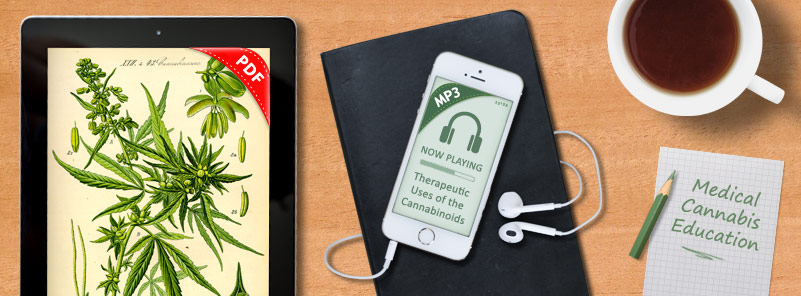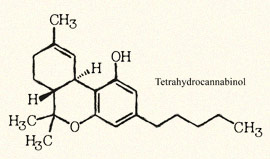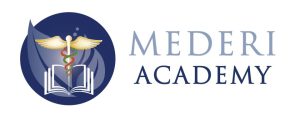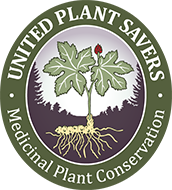Cannabis Therapeutics
An audio series for health care providers – bundled together in one discounted package:
- Six (6) audio lectures
- Digital book of notes (50 page PDF)
- Order with one click for $55 ($70 value)
Details: These six audio recordings offer the clinician detailed information on prescribing Medical Marijuana, the most appropriate delivery system for specific conditions, possible side effects and interactions. Includes complete references. Features up-to-date information on medicinal uses of Cannabis for pain, cancer, mental health conditions, sleep and more. Includes digital book of lecture notes (50 page PDF).
Naturopathic CE: If CME has not previously been earned for the below lectures (either in person or distance) you can earn 3.5 general and 6.5 pharmacy credits. See more Continuing Education details.
 Recordings included in this series:
Recordings included in this series:
Therapeutic Uses of the Cannabinoids and Other Cannabis Compounds, Part 1
Kenneth Proefrock presents his clinical experience using Cannabis therapeutically for a wide range of conditions from seizures, restless leg syndrome and insomnia, to cancer, MS, Parkinsons and chronic pain. Detailed usage information includes prescribing Medical Marijuana as an internal agent, a vapor, as food and in topical applications for pain. Speaker: Kenneth Proefrock, ND. (Product Code: 15SW01)
Therapeutic Uses of the Cannabinoids and Other Cannabis Compounds, Part 2
Continued from Part 1, Kenneth Proefrock continues presenting his clinical experience using Cannabis therapeutically for a wide range of conditions from seizures, restless leg syndrome and insomnia, to cancer, MS, Parkinsons and chronic pain. Includes some of the more interesting research on the variability of constituents with different cultivation techniques and cross-reactions with other therapeutic agents. Reviews laws surrounding medical uses with an emphasis on Arizona. Kenneth Proefrock, ND. (Product Code: 15SW02)
Use of Cannabis Compounds for Health and Disease Treatment: A Science-Based Review
Reviews over 250 clinical trials on the efficacy and safety of Medical Marijuana use for glaucoma, HIV/AIDs, opiate addiction, nausea, cancer-related cachexia, muscle spasms, epilepsy, pain, autoimmune diseases and inflammation. The benefits and drawbacks of different delivery systems, different solvents for extraction and vaporizers are discussed. Clinically relevant details on the chemistry, pharmacology, pharmacokinetics and pharmacodynamics of cannabinoids, including THC and CBD, are summarized. Speaker: Christopher Hobbs, PhD. (Product Code: 18SW03)
The Influence of Cannabis on the Psyche
Reports in both the biomedical literature and from patients suggest that there are beneficial effects of Medical Cannabis on various psychological conditions. Conversely, there are reports of detrimental influences of Cannabis on mental health, including addiction. This lecture discusses both sides and shines a light on a topic that will increasingly be discussed in healthcare provider forums and the press. Speaker: Kevin Spelman, PhD. (Product Code: 15ME30)
 Cannabis and Cancer: Sifting the Science
Cannabis and Cancer: Sifting the Science
The use of Medical Marijuana to treat issues such as cancer pain or chemo-induced nausea and vomiting is well established. However, there is also widespread patient interest in Medical Cannabis as a direct anticancer agent. This session reviews how cancer involves the endocannabinoid system, and presents data on the anticancer properties of Cannabis both in terms of cancer pathophysiology & molecular biology, as well as its effects on specific malignancies. Speaker: Jonathan Treasure, MNIMH. (Product Code: 17SW25)
Cannabis as an Alternative to Opioids, Benzodiazepines, NSAIDs and other Drugs
While these drugs can have unintended side effects, the use of Medical Marijuana as a substitute should be carefully evaluated for efficacy, adverse reactions and best use for either weaning patients from a drug or using it in conjunction to reduce drug dosage and negative effects. In a fair comparison, Medical Marijuana may be better, but a user may also develop tolerance, loss of effect, and side effects from Marijuana. Examine all sides of this topic with three experienced clinicians. Panelists: Paul Bergner, Jonathan Treasure and Kenneth Proefrock. (Product Code: 17SW17)
Plus, the Series Lecture Notes for Cannabis Therapeutics, in PDF format.










